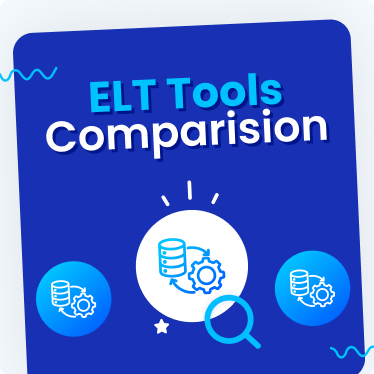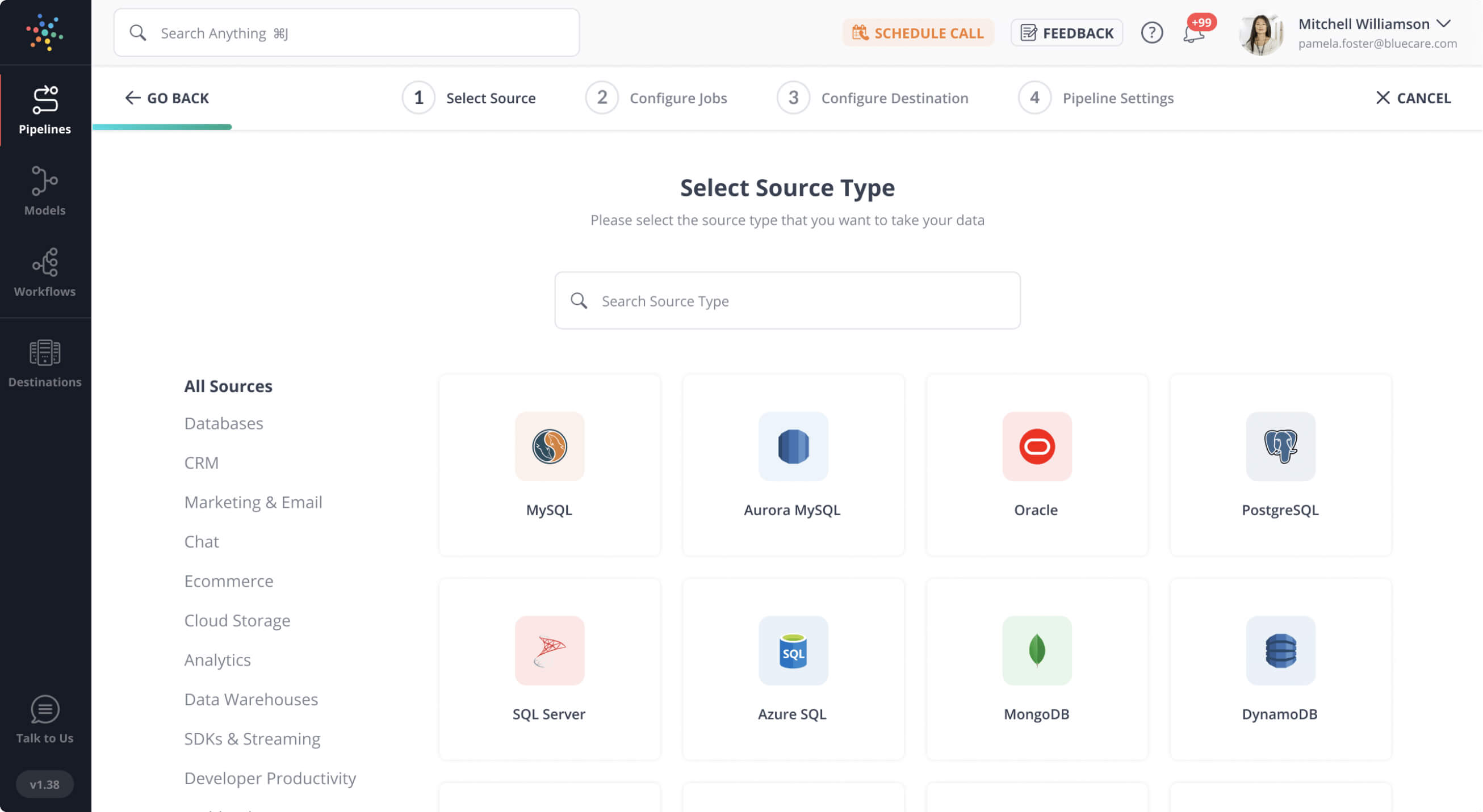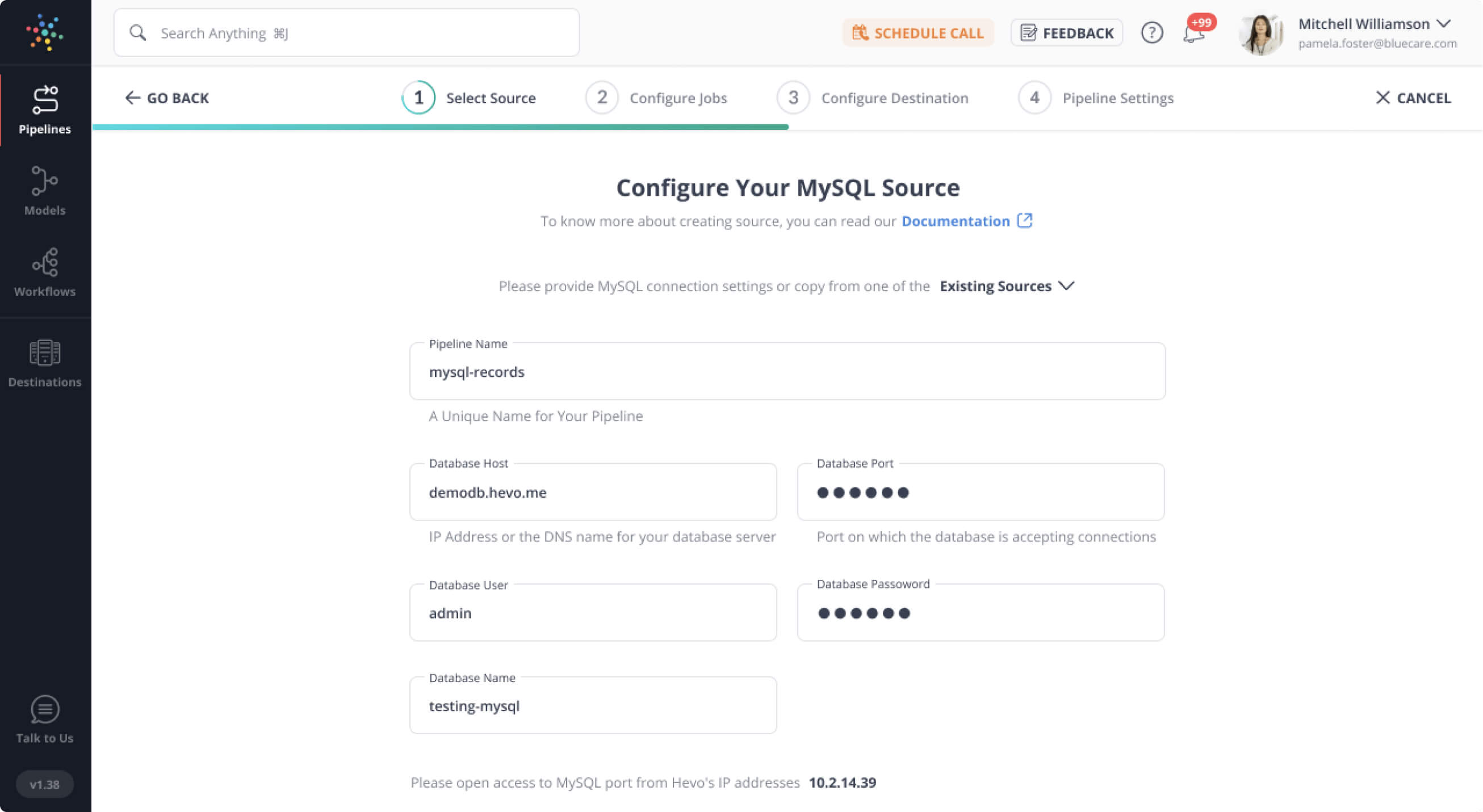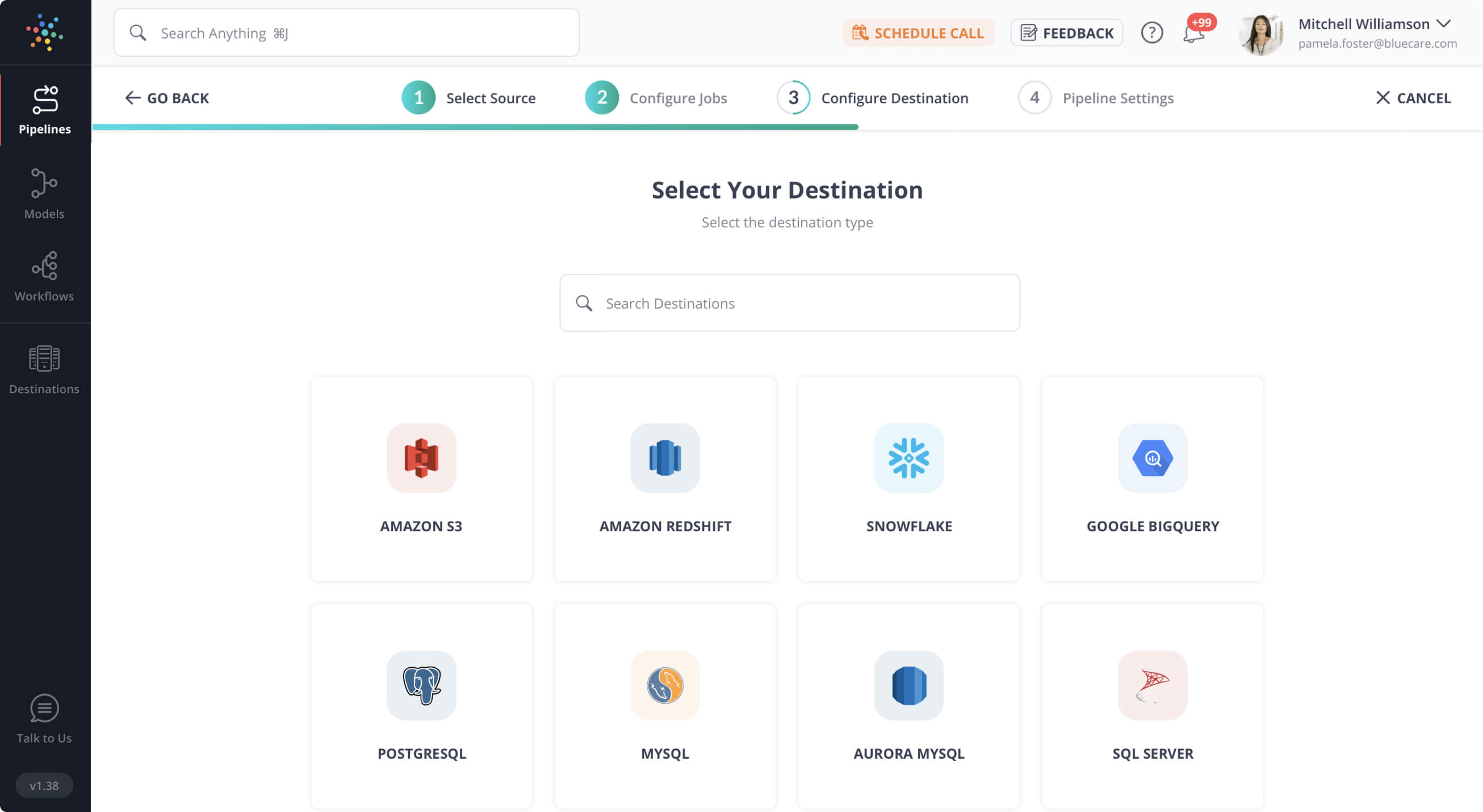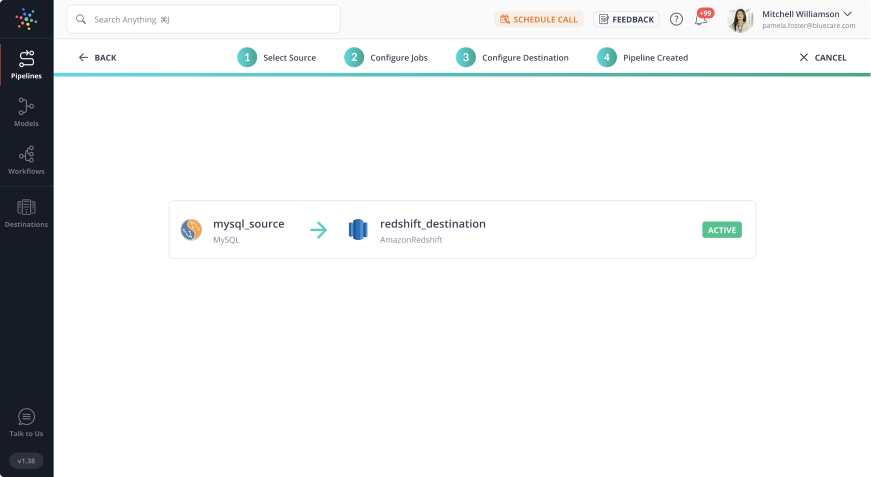 Key Takeaways
Key TakeawaysMatillion has strong ETL/ELT capabilities but users often seek more transparent pricing and easier scalability. Top 5 alternatives in 2026 include:
- Hevo Data: No-code pipelines, 150+ connectors, real-time sync, auto-schema mapping, flat pricing.
- Stitch: Simple relational replication; best for small teams, but limited NoSQL support.
- Fivetran: Near real-time ingestion with managed schemas; relies on dbt for complex transforms.
- Airbyte: Open-source freedom with custom connectors; growing library but still maturing.
- SnapLogic & Denodo: Enterprise-grade, visual data fabrics; ideal for hybrid/cloud but higher cost and complexity.
Choose based on your budget, scale, and whether you need real-time automation or extensive transformation features.
Matillion is a leading cloud-native ETL tool that helps businesses boost productivity and build powerful analytics quickly. It offers benefits like a user-friendly interface, component-based development, and easy setup through its marketplace and wizards.
While Matillion looks great on paper, it has real-world challenges that make users explore other options. Common issues include API limitations, cost control problems, and poor CI/CD support. Whether you’re facing these problems now or want to avoid them before choosing a platform, alternatives are worth considering.
This guide covers the best Matillion alternatives with their use cases, pros and cons, and detailed comparisons to help you find the right fit for your needs.
Table of Contents
Matillion Overview
Matillion is a data integration platform that helps businesses to rapidly load, transform, sync, and orchestrate data within modern cloud data environments. It enables users, through a no-code visual interface, to extract data from an array of sources, efficiently load it into cloud data warehouses like Snowflake, Amazon Redshift, Google BigQuery, Databricks and data lakes, and then perform transformations directly within these target platforms. Matillion also facilitates syncing transformed data back to operational systems.
Matillion primarily uses an ELT (Extract, Load, Transform) approach where data is loaded into the target cloud data warehouse/lakehouse first, and then transformations are executed using the power and scalability of the target platform itself.
Why Are People Moving Away from Matillion?
1. Limited Scalability
- Matillion often faces issues when handling multiple tasks or jobs simultaneously.
- Plus, the tool’s infrastructure is not flexible enough to handle large volumes of data or more complex workflows, making it harder to expand as your data needs grow.
2. Struggles with Complex Data Transformations
- Matillion falls short when it comes to handling intricate and complex data transformation workflows. And to add to your misery, as your data processing needs grow, so do the costs.

3. Inconsistent Customer Support
- There are multiple threads on how Matillion’s customer support starts to fade away once you start using the tool.
- There are delays in response time, and follow-ups are inconsistent, leaving the user high and dry when facing critical issues.
4. Weak Failure Handling & Scheduling
- Matillion’s job scheduling system is relatively basic and lacks the ability to handle complex workflows.
- Plus, it also lacks a built-in messaging system that notifies users about job failures or job alerts, which increases manual intervention when running a pipeline.
Top 10 Matillion Alternatives
As the demand for modern data integration tools keeps rising, users actively explore various alternatives and choose the best that suits them well.
1. Hevo Data
Gartner Rating: 4.6
Hevo is a fully managed data pipeline platform that makes data replication and transformation seamless. It handles automatic schema management and offers built-in transformation options to simplify data migration.
Whether you’re working with batch data or high-throughput streams, Hevo supports both. Its higher-tier plans include streaming pipeline capabilities and flexible pricing. By default, it syncs data every hour, but premium plans let you sync as often as every five minutes.
So, if you need both real-time and batch pipelines, many users turn to Hevo Data as a smarter alternative to Matillion.
Key features
- No-Code platform: Hevo’s no-code platform helps users set up their data pipelines without any technical knowledge and with only two steps.
- Real-Time Data Replication: The platform provides incremental replication for databases, ensuring any updates made in the source are added to the destination.
- Complex Data Handling: Hevo provides a modular event-driven pipeline, allowing it to handle complex data even at larger scales compared to other ETL tools.
User Reviews:

Pros
- Python and drag-and-drop transformations for stream processing.
- Supports higher-latency batch integrations.
- Automated schema management
- Easy-to-use built-in connectors for both batch and stream processing
Cons
- Updating established pipelines gets tricky.
- Lacks on-premise hosting options.
Why Choose Hevo Data over Matillion?
- No Vendor Lock-In: With Hevo, you don’t have to worry about vendor lock-in. Flexible subscription plans give you one less thing to worry about, allowing you to focus on deriving actionable insights from your data.
- Data transformation: Hevo provides support for both ELT and ETL workloads, allowing you to move the data your way! You have granular control over your data, build custom schemas, and move things that have an impact.
- Scalability: As your data sources and volume grow, Hevo scales horizontally and handles millions of records per minute with minimal latency.
Pricing
| Plan | Monthly plan | Annual plan | Included events |
| Free | No cost | No cost | 1 million (fixed) |
| Starter | USD 299/month | USD 239/month | Up to 50 million |
| Professional | USD 849/month | Usd 679/month | Up to 100 million |
| Business | custom | custom | Custom |
Check out this Case Study on how Hevo helped Thoughtspot with their data pipeline needs
For a more detailed comparison, check out Hevo vs Matillion.
2. Stitch Data
Gartner Rating: 4.5
Stitch Data offers a straightforward, cloud-first solution for getting your information from where it’s created into a central hub for analysis. At its core, Stitch is an ELT service, but with a particular emphasis on highly efficient “Extract” and “Load” phases.
What truly distinguishes Stitch is its unwavering commitment to simplicity and a pure ELT philosophy, strongly augmented by its foundation on Singer.io. Stitch focuses on doing one thing exceptionally well: replicating data.
Its “preparation” step, as they define it, is about making data compatible with your warehouse, not embedding business logic; the heavy lifting of transformation is intentionally left to be done in the destination. This lean approach is powerfully complemented by its use of Singer, an open-source standard for ETL scripts (called “taps” for sources and “targets” for destinations).
Stitch Data is ideal for startups, smaller data teams, and engineering-led organizations that prioritize speed, simplicity, and core data replication without unnecessary complexity. It shines for teams who embrace the ELT paradigm, preferring to load raw or lightly prepared data into their warehouse and then handle more intensive transformations using tools like dbt.
Key features:
- With Stitch Data Loader, you replicate data from various SaaS applications and databases into data warehouses and data lakes for analysis.
- Stitch Data pipelines automatically update, allowing you to focus on deriving business insights instead of IT.
- Stitch Data is built for the cloud, so it’s easy to set up and manage without needing on-premises infrastructure or extra help from IT teams.
Pros
- Provides Singer framework for building custom connectors
- Stitch offers up to 60 days of log retention.
- Straightforward interface for data extraction and loading
- Offers data transformation using SQL or Javascript.
Cons
- Stitch Data uses row-based pricing, which makes its pricing high when working with large amounts of data.
- Primarily focuses on EL (extract and load) and lacks robust transformation capabilities.
Why is Stitch Data a better alternative to Matillion?
- With Stitch, relational database replication works seamlessly. It manages schema and data type conversion and supports incremental replication. Stitch’s user interface simplifies table configuration for replication, making it one of the best Matillion alternatives for non-technical users.
Pricing
| Plan | Monthly plan | Yearly price | Number of rows |
| Standard | USD 100 | USD 1000 | 5 million |
| Advanced | USD 1250 | USD 15k (approx) | 100 million |
| Premium | USD 2500 | USD 30k (approx) | 1 billion |
3. Fivetran
Gartner Rating: 4.5
Fivetran is a prominent leader in the data integration landscape, renowned for its powerful automation and “set it and forget it” approach to moving data into cloud data warehouses.
Fivetran is built around the principle of Change Data Capture (CDC). This capability was significantly supercharged with the acquisition of HVR in 2021, integrating HVR’s best-in-class, log-based CDC technology directly into the Fivetran platform.
Instead of repeatedly querying entire databases, Fivetran HVR intelligently reads directly from the database transaction logs (for sources like Oracle, SQL Server, PostgreSQL, SAP HANA, and many others). This method captures every insert, update, and delete with minimal impact on the source system’s performance.
If your business deals with high-volume transactional data, requires efficient and low-impact CDC, operates under stringent security and governance policies, and ultimately wants a dependable, hands-off solution for data ingestion, Fivetran is purpose-built to meet these demanding requirements.
Key features
- You have the option to schedule a data sync from every minute to every 24 hours.
- Fivetran is a fully managed service. This means Fivetran handles all the ongoing maintenance, schema drift adaptation, API changes, and error recovery.
- Backed by global customer support, which is available 24/7/365 and has a guaranteed uptime of 99.9%.
- Fivetran supports soft/hard deletes and various write modes (append-only, upsert, etc.) for each destination.
- Flexible capture methods: Though log-based CDC is the default option, HVR supports flexibility using other capture methods, including: Trigger-Based Capture, Archive Log Only (ALO), and Direct Redo Access (exclusive to Oracle databases).
- Matillion is compliant with SOC 1, SOC 2, ISO 27001, HIPAA BAA, PCI DSS Level 1, HITRUST, and regional data protection regulations such as GDPR and CCPA.
Pros
- Minimal setup with automated pipeline management.
- Wide range of connectors for SaaS applications and databases.
- Scalable for high-volume data processing.
Cons
- Lacks enterprise data management.
- Limited data transformation support.
- A bit expensive for enterprises.
Why is Fivetran a better alternative to Matillion?
- Fivetran is one of the best Matillion alternatives for near-real-time ingestion needs. It’s the way to go when you need a rapid and straightforward method of loading data from external sources to a warehouse.
- Due to its limited code capabilities and internal transformations, it lacks automation and infrastructure. However, it excels at batch extraction and manages schema for you.
Pricing
- Fivetran has a forever-free plan that suits first-timers and those with minimal data volumes. It also has paid plans like the Standard Plan (starting at $500/million MAR), Enterprise Plan (starting at $667/million MAR), and Business Critical Plan (starting at $1,067/million MAR).
- It uses a volume-based pricing model centred around Monthly Active Rows (MARs) — the number of rows processed in your data warehouse each month.
You can read our blog on Fivetran vs Matillion for a detailed side-by-side comparison.
4. SnapLogic
Gartner Rating: 4.4
SnapLogic positions itself as an Intelligent Integration Platform as a Service (iPaaS). Using its extensive library of “Snaps” – pre-built, intelligent connectors, users can visually design and deploy pipelines for both application integration and data integration, all within a single, cohesive environment.
Iris AI technology embeds artificial intelligence and machine learning directly into the platform. Iris provides capabilities like AI-powered pipeline suggestions, auto-mapping of data fields between disparate systems, and even self-healing pipelines that can learn from past errors.
SnapLogic is an ideal choice for larger enterprises and organizations navigating intricate, hybrid IT environments that demand an agile platform for both application and data integration at scale.
Businesses that need to connect diverse cloud services with legacy on-premise systems, require robust API lifecycle management alongside their integration efforts, and want to empower both technical and less technical users to build integrations, will find SnapLogic’s unified and AI-enhanced approach a powerful enabler for digital transformation.
Key features
- Flexible hybrid architecture via the Snaplex execution network.
- SnapLogic’s no-code platform makes it easy for both developers and non-technical users to build integrations.
- Its secrets management tools securely store and manage credentials.
Pros
- SnapLogic supports both on-premises and cloud-based environments.
- SnapLogic offers excellent connectivity with SOAP and various third-party services through its Snap Packs, such as SAP, Salesforce, Workday, and ServiceNow.
- Its automated elastic scaling handles various traffic loads.
Cons
- Performance challenges with large data volumes.
- Customer support area needs improvement.
Why choose SnapLogic over Matillion?
- SnapLogic is a complete iPaaS (Integration Platform as a Service). It handles not just ELT (Extract, Load, Transform) but also app-to-app integrations, real-time data flows, and API management. Also, it comes with the benefits of an AI-powered tool.
- On the other hand, Matillion focuses mainly on ELT for cloud data warehouses. If your world revolves around data warehouse transformations and you’re okay keeping it there, Matillion works. But if you need to integrate various systems and data types (structured, unstructured, APIs, etc.), SnapLogic wins.
Pricing
- SnapLogic offers tiered subscription plans that scale with your needs. The Standard Plan starts at $1,500 per month and includes 10 Snaps, 1 user, and basic support. The Enterprise Plan is priced at $6,000 per month and includes 100 Snaps, 10 users, and premium support.
- In addition, SnapLogic offers premium Snap Packs, also known as premium Snaps, which come in two tiers: Tier One (starts at $45k) includes advanced, customized integrations for enterprise applications like Workday and NetSuite. Tier Two ($15k ) offers more targeted functionality at a lower entry point.
5. TIBCO Software

Gartner Rating: 4.4
TIBCO’s integration platform is an enterprise-grade platform designed to serve as the central nervous system for complex, distributed organizations. It empowers businesses to connect virtually any application, data source, or device, whether on-premises, in the cloud, or at the edge.
What truly sets TIBCO apart is its event-driven architectures (EDA) and real-time data processing at scale. While many platforms now offer event triggers, TIBCO’s technology, like TIBCO Messaging and TIBCO StreamBase, is engineered for high-throughput, low-latency event stream processing, allowing businesses to analyze, act upon, and integrate data as it happens.
TIBCO’s platform is ideally suited for large, global enterprises, particularly those in industries like finance, telecommunications, energy, and logistics, that have mission-critical integration needs and often operate complex hybrid environments. It’s for businesses looking not just to connect applications, but to fundamentally re-architect their operations around real-time data and agile, API-led interactions.
Key features
- TIBCO Cloud Integration pre-built connectors are built for popular enterprise systems.
- TIBCO provides advanced API management, master data management (MDM), and virtualization capabilities.
- The tool supports B2B/EDI integration, enabling the exchange of business documents.
Pros
- TIBCO can be installed on-premises or through the internet.
- Connects to various third-party tools, databases, and apps. For example, users can link Tibco Spotfire to the R Project for more complex analyses.
- Facilitates real-time event processing.
Cons
- Lacks detailed documentation and a high learning curve.
- The Web-based version of Tibco Spotfire differs significantly from the actual software.
Why choose TIBCO software over Matillion?
- TIBCO and Matillion both offer data integration tools, but TIBCO stands out for its robust enterprise-level capabilities. Large-scale organizations often choose it for secure data movement, on-premise deployments, and seamless integration with legacy systems.
Pricing
| Basic | Premium | Hybrid |
| Starts at $400/month | Starts at $1500/month | Custom |
6. Denodo
Gartner Rating: 4.5
The Denodo Platform offers a fundamentally different approach to data integration and management. Instead of physically moving and consolidating data into a central repository like a traditional data warehouse via ETL, Denodo creates a logical data fabric. This means it provides a unified, real-time view of data from disparate sources, be they on-premises databases, cloud applications, big data stores, or unstructured files, without replicating it.
Denodo’s most profound unique feature is its data virtualization-first architecture. While other tools might offer data virtualization as an add-on, for Denodo, it is the core. It features an Active Data Catalog that’s deeply integrated, not just for discovering data assets but also for providing AI/ML-powered recommendations, enriching metadata, and understanding data lineage within the virtualized environment.
Denodo is an ideal solution for enterprises grappling with data silos, needing agile and faster access to data for analytics and operational use cases, and looking to reduce the complexity and cost associated with traditional data replication and ETL processes.
Key features
- Denodo lets business users find and explore data on their own using tools like the data catalog and AI help.
- Denodo offers advanced caching strategies, including incremental, partial, and summary-based caching to boost performance for frequently accessed virtualized data, without requiring full replication.
- Its dynamic query optimizer efficiently executes queries across multiple sources.
Pros
- AI/ML-powered Smart Query Acceleration
- Offers data discovery and understanding, enhancing traceability.
- Provides robust security features and governance capabilities.
Cons
- There isn’t much documentation available for Denodo since it only has a tiny group of super users.
- Denodo might not be a good choice for smaller companies because data virtualization is an expensive technology.
- You will have to rely on caching for some slower datasets, which might add to the overhead.
Why choose Denodo over Matillion?
- With Denodo, you can easily enable cloud migrations, legacy replacement, and multi-cloud deployments with minimal cost and disruption. It also provides you with centralized control of data query executions for complete governance and security.
- For large enterprises with segregated datasets, Donodo is one of the best Matillion alternatives. Since large enterprises can pay the licensing fees and are frequently entrusted with combining data from many contexts across the organization, Denodo flourishes in these environments.
Pricing
| Plan | Price (per hour) | Cores |
| Denodo Professional | $6.27 | 4 |
| Denodo Standard | $10.63 | 4 |
7. Airbyte
G2 Rating: 4.5
Airbyte is a leading open-source data integration platform. It uses Debezium as an embedded library to capture and monitor changes in your database. Airbyte also provides AI-assisted functionality, which reads through your API documentation and autofills the configuration fields while setting up the CDC pipeline.
What truly sets Airbyte apart is its commitment to open-source principles and its powerful Connector Development Kit (CDK). While many platforms offer connectors, Airbyte empowers users to build new connectors in any programming language (packaged as Docker containers). This community-driven approach, coupled with features like AI-assisted connector configuration, where Airbyte can read API documentation to help autofill setup fields, fosters a transparent, rapidly evolving ecosystem.
Airbyte is an exceptional choice for engineering teams that champion open-source solutions and require unparalleled flexibility in their data integration strategy. If you’re looking to break free from vendor lock-in, need to connect to unique or internal data sources, want to contribute to or benefit from a vibrant community, or simply seek a cost-effective (especially when self-hosting) yet powerful ELT tool with strong CDC capabilities, Airbyte offers a compelling and future-proof platform.
Key features
- Flexibility to Develop Python CDC Pipelines: Through PyAirbyte, Airbyte’s open-source Python library, users can develop and manage CDC pipelines in Python.
- Structured and Unstructured Sources: Airbyte supports both structured and unstructured data sources and vector database destinations, making it an ideal solution for AI use cases.
- 550+ pre-built connectors for databases, APIs, and SaaS tools with community support.
- It supports deployment on the cloud, on-premises, or with managed services.
Pros
- The GitHub and Slack community provides active support and collaboration opportunities.
- Offers secure data handling and supports enterprise compliance requirements.
Cons
- A very limited number of pre-built connectors are available.
- Requires you to invest some of your engineering bandwidth in developing, monitoring & fixing any issues.
- There are frequent new releases & lack of effective error handling.
Why choose Airbyte over Matillion?
Here are some advantages that make Airbyte a better alternative to Matillion.
- When you’re ready to move a connector into production, Airbyte will certify it to ensure it’s reliable and production-ready.
- Since all the Airbyte connectors are running on Docker containers, you can ensure independent operations.
- You can continuously track your custom connectors, refresh them on demand, and schedule updates as needed.
Pricing
Airbyte charges based on the number of rows you replicate from APIs or the volume of data you transfer from source to destination. Input your requirements here and get the price estimate.
8.Integrate.io
G2 Rating: 4.1
Integrate.io is a cloud-based ETL platform that helps users organize and prepare data for advanced business intelligence, customer data, and analytical purposes. It goes beyond basic ETL, offering a powerful suite that includes ETL & Reverse ETL (which they also term Data Warehouse Insights – DWI), ELT & Change Data Capture (CDC), and even API Management and Generation. The entire platform is built around an intuitive, visual no-code/low-code interface.
Its integrated API management and generation capabilities enable businesses to easily expose their data or integration workflows as secure, consumable APIs, transforming data pipelines into readily available data services. The platform also highlights specialized B2B SaaS Data solutions, particularly for Salesforce users, offering pre-built templates and focused integration flows to address common challenges in that ecosystem, and emphasizes data observability for monitoring pipeline health and data quality.
Integrate.io is exceptionally well-suited for organizations of all sizes that are looking for a versatile, yet user-friendly platform to manage their end-to-end data lifecycle without requiring deep coding expertise for each distinct task.
Key features
- It offers REST API access, enabling programmatic control over data pipelines.
- Offers powerful in-platform transformations using SQL-based expressions.
Pros
- You can easily manage source-to-destination connections with an added ability to add notes to dataflows.
- Even entry-level plans come with dedicated human support.
Cons
- You need some technical expertise to get started with the software, as it has a significant learning curve.
- You might find it challenging to debug as the error logs lack specificity.
Pricing
- Integrate.io doesn’t publicly disclose its pricing, but it uses a flat-rate model so you can move unlimited data through integrations without worrying about surprise costs. It also offers a standard 14-day free trial to explore its features.
9. Adverity
G2 Rating: 4.5
Adverity steps in as a specialized data integration and analytics platform designed particularly for marketing, sales, and e-commerce data. At its core, Adverity automates the often painstaking process of collecting data from a vast array of sources (boasting over 700 pre-built connectors), transforming it into a usable format, and delivering it to data warehouses, BI tools, or its own analytics environment.
Adverity’s unique strength lies in its deep focus and specialization within the marketing and advertising ecosystem. Adverity excels at intelligently harmonizing and normalizing marketing-specific metrics from disparate sources.
Adverity is an ideal solution for marketing teams, advertising agencies, and e-commerce businesses that are struggling to consolidate and make sense of their sprawling data landscape. If your team spends more time manually exporting and cobbling together spreadsheets than actually analyzing performance, or if you need to rapidly understand the true ROI of your campaigns across numerous channels, Adverity is built to address these pain points
Key features
- 600+ data connectors to various marketing, finance, and sales data sources.
- Offers dashboards, reporting, and AI-powered insights tailored to understanding campaign effectiveness, ROI, and cross-channel performance
- Includes advanced visualization features like heatmaps, conditional formatting, and drill-down capabilities.
Pros
- Custom reports.
- High-quality customer service.
- Improved efficiency of data management and operations.
Cons
- Lack of immediate alerts when a problem occurs.
- Learning curve to adapt the product
Why choose Adverity over Matillion?
- Adverity is the answer for Marketing Organizations that want to take control of their data architecture, all without having a specialized Analytics/Engineering team. It allows you to do away with hours of tedious manual work in Excel and creates a flexible and scalable BI practice.
- Adverity offers excellent customer service. It allows users to leverage the platform as power users, irrespective of their technical skills.
Pricing
| Plan | Price (per month) | Includes |
| Standard | USD 500 | Standard data connectors, storage, and BI data destinations |
| Professional | USD 2000 | More data rows, additional data sources, and expanded destination options |
10. Astera
Gartner Rating: 4.2
Astera is an enterprise-grade, unified data integration platform designed to simplify and accelerate how organizations manage their complete data lifecycle. The platform focuses on automating complex data workflows, enabling businesses to ensure data quality, consistency, and accessibility for analytics and decision-making.
Astera distinguishes itself with key capabilities like its user-friendly handling of complex unstructured and hierarchical data formats, such as PDFs, COBOL, EDI, and intricate XML/JSON structures, often providing more built-in parsing and data mapping power. Secondly, its data warehousing automation features include automated schema generation, surrogate key management, and streamlined handling of Slowly Changing Dimensions (SCDs) with minimal custom coding.
Organizations that require deep, granular control over complex data transformations, need to integrate challenging data formats without extensive custom scripting, or are looking to automate their data warehousing build and maintenance processes significantly, will find its capabilities particularly valuable.
Key features
- Facilitates automated data pipelines with 200+ transformations and scheduling.
- It makes keeping track of EDIs(electronic data interchange) easy and simple.
- The platform’s high-performance, parallel-processing engine divides large datasets into smaller subsets, processing them concurrently.
Pros
- Astera has a great customer support team that is readily available to answer your queries or issues.
- It houses an easy-to-use UI.
- Astera delivers frequent updates for their platforms, ensuring they offer the best-in-class features and high data security.
Cons
- Astera doesn’t offer comprehensive documentation.
- Various essential features are exclusive to the Enterprise edition.
- Data logging and error handling features aren’t up to the mark.
Why choose Astera over Matillion?
- Astera’s ETL Tools are designed to simplify the life of Financial Analysts by connecting with various Finance Data Sources such as Stripe, QuickBooks, etc. These offer a crucial Data Integration component to eliminate the manual unification of data and reports from various sources. Thus, it helps generate a single integrated view of “cash register” systems.
Pricing
- Astera doesn’t list its pricing publicly, so for a precise quote tailored to your needs, it’s best to contact their sales team directly. Based on user reviews, the base package is estimated to cost around $30,000 per year.
Here is a quick comparison table of all the tools that we have discussed in this blog:
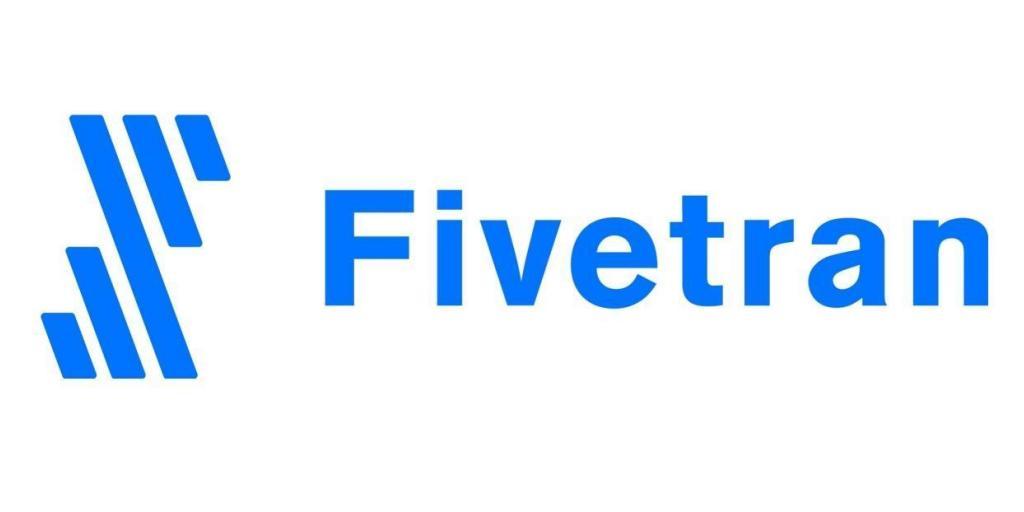 | ||||||
| Reviews |  4.5 (250+ reviews) |  4.8 (70+ reviews) |  4.2 (400+ reviews) |  4.4 (80+ reviews) |  4.5 (50+ reviews) |  4.7 (200+ reviews) |
| Pricing | Usage-based pricing | Row based pricing | MAR-based pricing | Consumption-based pricing | Volume/capacity-based pricing | Fixed-fee pricing model |
| Free Plan |  |  |  |  Open source | ||
| Free Trial |  14-day free trial |  14 days free trial |  14-day free trial |  14-day free trial |  14-day free trial |  14 days free trial |
| Key Feature | No-code ELT with schema handling | Singer-based simple ELT | Log-based CDC via HVR | GUI ELT with orchestration | Docker-based OSS CDK | Unified data platform |
| Pros | Python + drag-drop, scalable | Custom conns, easy UI | 500+ conns, reliable | Quick setup, reusable comps | Cloud or on-prem options | Flat pricing, human support |
| Cons | No on-prem; edits tricky | Few transforms; costly scale | Limited transform layer | Costly at scale | Breaking changes often | Steep learning curve |
Factors to Consider When Choosing a Matillion Alternative?
- Pricing: Matillion pricing is based on virtual core per hour usage. One credit = one hour of vCore usage. If you regularly load large data volumes, consider alternatives with flat monthly rates to avoid surprise bills.
- Cloud stack support: Different tools fit different cloud environments. For example, Hevo is a completely Saas product. It runs and manages on its own servers and requires minimal infrastructure support and ease of use. In contrast, Matillion runs on your cloud, so you’ll need to handle setup and management.
- Orchestration: It’s not just about building pipelines. It’s also about orchestrating them intelligently. Talend offers enterprise-grade orchestration with complex workflow management. Hevo supports event-based triggers and real-time sync. Fivetran mostly sticks to scheduled syncs without complex conditional logic.
- Monitoring: Meta-monitoring and lineage features are important when selecting an ETL tool. Talend offers enterprise-grade orchestration with complex workflow management. Hevo supports event-based triggers and real-time sync. And Fivetran mostly sticks to scheduled syncs without complex conditional logic.
Still Confused About Which Data Integration Tool is Right for You?
Conclusion
This blog introduced you to Matillion and its limitations. It also provided you with a comprehensive list of the top 10 Matillion Alternatives you can use.
As you collect and manage your data across several applications and databases in your business, it is essential to consolidate it for a complete performance analysis of your business. You can comfortably achieve this through a Cloud-based ETL tool such as Hevo.
Sign up for a 14-day free trial and experience Hevo’s feature-rich suite to see why it could be a better choice than Matillion for your use cases.
Matillion Competitors FAQs
1. Is Matillion ETL or ELT?
Matillion is primarily an ELT (Extract, Load, Transform) tool. Unlike traditional ETL tools that transform data before loading it into a data warehouse, Matillion performs transformations after the data is loaded into the warehouse, leveraging the power of the database to perform transformations.
2. What is the difference between Snowflake and Matillion?
Snowflake:
1. Type: Cloud-based data warehousing platform.
2. Function: Provides data storage, processing, and analytic solutions that are faster, easier to use, and far more flexible than traditional offerings
Matillion:
1. Type: ELT tool.
2. Function: Focuses on data integration and transformation tasks to prepare data for analysis within data warehouses like Snowflake.
3. Does Matillion run on AWS?
Yes, Matillion runs on AWS (Amazon Web Services). Matillion provides several products that are specifically designed to integrate with AWS services, including:
1. Matillion ETL for Amazon Redshift
2. Matillion ETL for Amazon S3
3. Matillion ETL for Amazon RDS
Share your experience of learning about the Top 10 Matillion Alternatives! Let us know in the comments section below!


